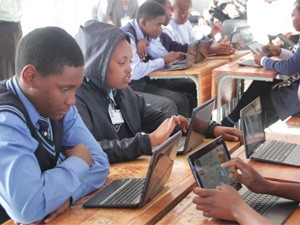
Government's goal to provide broadband to all by 2020 can be fulfilled once the state puts regulations in place that will allow widespread adoption of the relatively new television white spaces (TVWS) technology.
Using the spaces between television channels to provide broadband is being mooted as an affordable way to provide connectivity to communities, especially those in rural areas, and to fill the gaps in SA's broadband networks.
Microsoft SA MD Mteto Nyati, speaking on the sidelines of a pilot launch in Limpopo yesterday, said TVWS is a solution to universal broadband, as it will require a fraction of the investment needed to roll-out mobile services to all. This figure has previously been mooted at around R90 billion.
Affordable access
Nyati says the speeds delivered will be between 4Mbps and 6Mbps, and could cost as little as R20 a month for uncapped services, and the technology can be used to fill the gaps in current coverage. As the technology improves, speeds will pick up, he adds. "This is serving a need; it is serving a real need." A speed test performed at Doasho High School, in Limpopo, yesterday afternoon, showed upload speeds of 3.58Mbps and download speeds of 2.49Mbps.
Multisource GM Mario Scalco says TVWS is a "silver bullet" that bridges the gap between GSM technologies and WiFi access. He notes that GSM, while having more reach, is costly, while WiFi - which is cheaper - has a limited range.
Independent telecoms researcher Samantha Perry says while the technology will not offer speeds of 100Mbps, given government's urge to provide broadband to all at an average download speed of 5Mbps by 2016, TVWS could well be a silver bullet, filling the gaps in current coverage.
Paul Garnett, director of technology policy for Microsoft, says there may be instances in which TVWS is not the right technology, and this will depend on specific situations. Nyati adds the technology will not currently be useful for those who want high-speed broadband.
Garnett says when this way of accessing frequency becomes the norm, there will be ramifications in the way spectrum is managed, as well as for competition in the sector. He notes, however, that TVWS projects do not happen without collaboration.
Microsoft partnered with the Department of Science and Technology, the Council for Industrial and Scientific Research (CSIR), the University of Limpopo and Multisource for its five-school Limpopo project. Google's bid, which came to an end successfully last November, involved the CSIR Meraka Institute, Tertiary Education and Research Network of South Africa (Tenet), e-Schools Network, the Wireless Access Providers' Association and Carlson Wireless.
Regulatory efforts
Garnett says SA's much-delayed move to digital television, which has been in the works for several years but has stalled, will create more opportunities to use the technology. Yet, he notes, there is no reason to wait for the shift off analogue. "We can't afford to wait."
Tenet's TVWS manager, Arno Hart, notes interested parties in the space are working with the Independent Communications Authority of SA (ICASA) to develop a regulatory framework. "We're all on the same mission."
Hart says the regulator is making "great progress" and has assigned a budget and a team to develop the framework, with a view to have a public review at the beginning of next year. This will pave the way for commercial deployment in 2016. ICASA was not able to confirm this process as its business plan has yet to be approved.
TVWS knowledge gained in SA, including a breakthrough in the ability to use adjacent channels - which was not permissible in the US - is also being used to impact US policies, notes Hart. He says experiences in Africa are being used to drive regulatory policy elsewhere.
Share